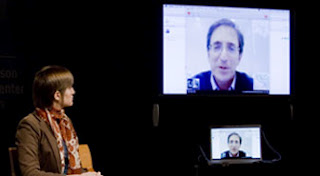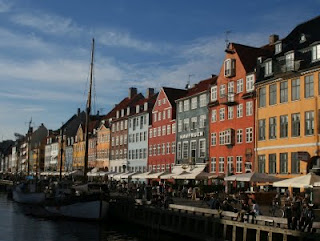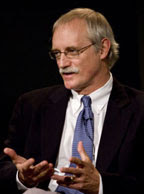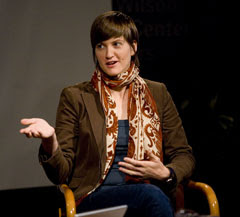Showing posts from category energy.
-
Patriotism: Red, White, and Blue…and Green?
›“National security often means cyber security, it means energy security, it means homeland security, and more and more…it means environmental security,” says retired U.S. Army Captain James Morin in the Pew Project on National Security, Energy and Climate’s recently released video short, “Climate Patriots.”
“Climate Patriots” calls attention to the nexus between energy, climate change, and national security. The video identifies climate change as a two-fold threat likely to increase the frequency and intensity of humanitarian disasters and political instability. The latter, military analysts believe, will fuel further conflict, fundamentalism, and terrorism.
“Climate Patriots” also touches on military efforts to combat climate change (e.g., reducing energy consumption and shifting to renewable fuel supplies) as well as Center for Naval Analyses (CNA) research on national security, energy, and climate.
“If we don’t take action now,” retired U.S. Navy Vice Admiral Dennis McGinn says, “the options for dealing with the effects of climate change and the effects of energy security become much, much more expensive. In fact, some of the options completely go away over the next 10-20 years if we don’t start taking some prudent actions now.” -
Price of Coal Surges!
›December 23, 2009 // By Geoffrey D. DabelkoThe price of coal surged this morning as a new buyer entered the market. A high-volume rush order came in from the North Pole in the last few hours, accounting for the surge. Shaking his head, one dazed trader said the size of the order was equivalent to the yearly total of a medium-size country with no green energy sector.
When pressed to reveal the source of the demand, traders grudgingly admitted a white-bearded man clad in red had suddenly appeared, agitated and mumbling about those who simply couldn’t be good for goodness’ sake. He had come straight from the Bella Center and was scrolling through a long list of names on his Blackberry. “It just keeps getting longer and longer!” he cried. With a bottle of Carlsberg in hand, he made some final calculations and proclaimed he had a sudden need for coal ready for delivery in two day’s time.
Satisfied he’d have adequate supplies ready for pickup in every country from the North to the South, he made his way up to the roof of the trading house. Those close at hand overheard him say, “Good night to you all, but I won’t see you next year. I’ll have to come up with something else for these naughty types. They will probably just burn this stuff.”
“At least Mexico City will be warmer!”
Photo: Courtesy David Hawxhurst, Woodrow Wilson Center -
Climate and Security Comes to Copenhagen
›December 10, 2009 // By Geoffrey D. DabelkoThe Danish Ministry of Foreign Affairs is bringing climate and security links to the Copenhagen confab in Week Two of COP15. The foreign and security policy implications of climate change are appealing both analytically and politically for many players, albeit from very different points of reference (think Tuvalu versus Bangladesh versus the United States, for example). Others, of course, think it is rubbish.
Danish Foreign Minister Peter Stig Møller laid out his thinking back in September at a one-day conference at the ministry. MFA’s December 15th side event will feature former Danish PM and current NATO Secretary-General Anders Fogh Rasmussen, African Union Commission Chair Jean Ping, and Swedish Foreign Minister Carl Bildt. Some other big names are possible as well. You can RSVP for one of the 400 seats at MEK@UM.DK although registration may close today!
On December 17th, you can get another dose of climate and security talk at “Delivering Climate Security,” where the expert-level players will make their pitches. New Security Beat has video interviews with half of the panel’s speakers: Nick Mabey of E3G, Carol Dumaine of U.S. Department of Energy, and Cleo Paskal of Chatham House. Joining them will be Brigadier General Wendell Chris King (Ret.), dean of academics for the U.S. Army Command and General Staff College; Rear Admiral Neil Morisetti, the UK’s climate and energy security envoy, Major General Muniruzzaman (Ret.), who is president of the Bangladesh Institute for Peace and Security Studies.
So while the climate and security angle is not front-and-center in the negotiations on emissions targets or financing, it will have a hearing at this year’s ultimate climate forum. Let’s hope this attention extends beyond this month’s political crescendo, demonstrating an interest in the analytical links and their varied implications, rather than merely in the political expediency of climate security as slogan. -
Interactive U.S. Map Shows Population, Energy, and Climate Data by State
›A new interactive map, developed by the Center for Environment and Population (CEP) and Clean Air-Cool Planet (CACP), lists state-level data on population, energy consumption, CO2 emissions, and vehicle-miles traveled. Accompanying the U.S. Population, Energy, & Climate Change report, the map depicts the sub-national, local level analysis necessary to help policymakers focus on the areas with the potential for the greatest gains.
Highlights:- New York has the “lowest state per-capita energy consumption, CO2 emissions, electricity consumption, and vehicle miles traveled,” and “it’s the only U.S. city where over half (about 75 percent) of the households don’t own a car.”
- Idaho “ranks fifth in growing population,” but “state per-capita CO2 emissions and electricity consumption are among the lowest in nation.” Most improved of all U.S. states in energy efficiency, Idaho “ranks fifth in renewable energy production and consumption per-capita.”
- Louisiana “ranked tenth in renewable energy production and consumption per-capita,” but still ranked “among [the] top ten states in energy consumption and CO2 emissions per-capita.” The state has a shrinking population and “is particularly vulnerable to sea level rise and severe coastal weather events.”
-
Covering Climate: What’s Population Got to Do With It?
›November 9, 2009 // By Dan Asin“There’s a correlation between CO2 and population. And it’s that we live in a world of more people, more money and more things, and that all distills down to the need for more energy,” said Dennis Dimick, executive editor of National Geographic, at a Wilson Center event on the media’s coverage of climate change and population, co-sponsored by the Society of Environmental Journalists and the International Reporting Project.
“Thinking about population and trends in population is a vital reality check for assessing policies you hear about on global warming,” said New York Times reporter Andrew Revkin, who joined Dimick and Nation Web Editor Emily Douglas via video conference. “When you start to think about that number—nine billion—a lot of cheery suppositions or assertions you’ve heard about how we’re going to de-carbonize the world without too much effort…[get] challenged in a hurry,” he said.
The Inconvenient Truth of Population
Despite these strong connections, the mainstream media has been reluctant to write about population growth, which Revkin called the “ultimate incremental story.”
“We, I think, are guilty to some extent, in the media, of not paying adequate attention to this part of the whole issue,” he said, partly because there is the perception that “we kind of solved that problem. But, again, just run those numbers: Nine billion people does not solve the climate problem and it has to be considered in every stage of assessing solutions to the climate problem.”
“We need to talk about it so we understand this issue at a level beyond more people means more emissions,” said Douglas. Other factors like levels of consumption, urbanization, and household structure make the population-emissions relationship complex and difficult to explain.
Revkin added that “consumption is even a tougher story to get at in print, because we’re a medium that advertises consumption, among other things.”
The Population-Energy Challenge
One-quarter of the world’s population lacks access to electricity. “We are in this sort of double-vise, trying to constrain our own [energy] demand while also trying to provide the opportunities for people who have little to none,” said Dimick.
of double-vise, trying to constrain our own [energy] demand while also trying to provide the opportunities for people who have little to none,” said Dimick.
With fossil fuels currently providing 80 percent of global energy, and with energy demand estimated to increase dramatically to meet the needs of 2.3 billion more people by 2050, the “scale of the challenge before us . . . is immense,” he said. “To think that we’re somehow simply going to go to solar and wind—I think we’re deluding ourselves.”
Nevertheless, Dimick insisted on the need “to de-carbonize at a tremendous scale.” He proposed sustainably addressing energy needs by improving energy efficiency, expanding mass transit systems, changing land use, and considering nuclear power.
Reproductive Health Is Key
Douglas, who previously edited the RH Reality Check blog, emphasized that population issues go far beyond climate change. “I’m encouraging us to look at population not only from the perspective of the environment, but also from the perspective of individual women and their human rights, their right to determine the number and spacing of their children, and not purely to depress fertility rates in service of mitigating climate change,” she said. According to Douglas, each year 60 million pregnancies—one-third of the global total—are unintended, and 200 million women worldwide have an unmet need for contraception. Family planning programs are “cheap to employ and deploy, and women and societies want them anyway,” said Douglas. A few recent studies have argued that universal access to family planning could be one of the most cost-effective ways to reduce greenhouse gas emissions.
According to Douglas, each year 60 million pregnancies—one-third of the global total—are unintended, and 200 million women worldwide have an unmet need for contraception. Family planning programs are “cheap to employ and deploy, and women and societies want them anyway,” said Douglas. A few recent studies have argued that universal access to family planning could be one of the most cost-effective ways to reduce greenhouse gas emissions.
And not just mitigation, but adaptation as well: “Women with access to reproductive health services are healthier and they’re better able to deal with the impacts of climate change,” she said. “Poorer countries are going to need adaptation strategies, and one of those strategies is to allow women to better determine the size of their families.”
However, “many political leaders–not only on the right—don’t like reproductive health programs,” said Douglas. Disagreements over abortion and birth control are part of the problem, as well as past instances of coercive contraceptive methods in some developing countries.
Douglas cited a Population Action International survey that “found that 41 countries identified population growth as a factor that makes them more vulnerable to climate change, but only two of those countries proposed programs that address reproductive health.”
Douglas decried the “significant gap between political leaders’ understanding that population growth makes it more difficult for them to respond to climate change, and political leaders being able to muster the political will that will empower women to better control their own fertility.”
Close-Up on the Most Vulnerable
“We also can’t talk about this as though all people added to the world population produce greenhouse gases in equal measure,” said Douglas. “The world’s richest half billion people, that’s 7 percent of the global population, are responsible for 50 percent of the world’s carbon dioxide emissions. Meanwhile, the poorest 50 percent are responsible for just 7 percent of emissions.”
Revkin urged reporters to use a “close-up lens” when examining population trends impact on climate—especially in “areas of the world where there are significant risks that could be amplified by human-driven climate change, like urban severe flooding and severe rains, like we saw in Manila recently.”
With rapid urbanization in the developing world, “you have to look at places where you have hugely increased numbers of people moving essentially into harm’s way—or being born in harm’s way, if you’re talking about sub-Saharan Africa,” said Revkin.
A Thought Experiment
“What if the whole world were equal in emissions?” Revkin asked. Suppose advanced industrial countries, such as the United States, reduce their annual emissions intensity from 20 tons of CO2 per person to 10 tons. At the same time, suppose rapidly developing countries, such as India, reach the same emissions intensity. In a world with nine billion people that equates to 90 billion tons—“three times today’s current annual emissions of CO2,” he said.
“Probably the single most concrete and substantive thing a young American could to do to lower a carbon footprint is not turning of the lights or driving a Prius, but having fewer children,” said Revkin. “Eventually, should you get credit—if we’re going to become carbon-centric—for having a one child family when you could’ve had two or three? Obviously it’s just a thought experiment, but it raises some interesting questions.”
Drafted by Daniel Asin and Meaghan Parker
Edited by Meaghan Parker -
VIDEO: Carol Dumaine on Energy and Environmental Security in the 21st Century
›November 2, 2009 // By Wilson Center Staff“[W]e’re facing unprecedented challenges, literally things that have never happened in the history of human kind, and that should give us some pause… Not only rising temperatures but dramatic changes in precipitation, possibility of millions of people having to be relocated, and challenges to governance on scales that we perhaps haven’t seen before,” says Carol Dumaine, deputy directory of energy and environmental security at the U.S. Department of Energy, in a conversation with ECSP Director Geoff Dabelko.
Dumaine emphasizes that tackling the 21st century’s broad energy and environmental security challenges requires study by experts from a range of fields, including zoology, virology, and information science. To this end, the Department of Energy hopes to leverage its years of investment and research with “the expertise that exists in the private sector and academia and think tanks.”
Looking toward the future, Dumaine identifies global cooperation as key. “The paradigm is a very diffuse, globally distributed risk, and the response must be very diffuse, globally distributed intelligence.” -
VIDEO: Cleo Paskal on How Climate Change Will Destabilize Energy Supplies
›October 26, 2009 // By Wilson Center Staff“Climate change is going to have a very large effect on the ability to extract, distribute, [and] refine energy—in every sector,” says Cleo Paskal, associate fellow for the Energy, Environment, and Development Programme at Chatham House. “You’re going to very likely see increasing instability,” she tells ECSP Director Geoff Dabelko in this video interview.
When hydroelectric dams are built, Paskal explains, planners inspect the site to determine the river flow, precipitation levels, and similar measures. But with climate change, “those constants have now all become variables, so your hydro generation is going to be severely affected.”
Last year, India “had an 8 percent decline in the ability to generate hydroelectricity because of changing precipitation patterns. This year…it looks like it’s going to be 12 percent because the monsoon is failing.”
Coastal nuclear power plants will face rising sea levels, increasing storm surges, coastal erosion, while those on rivers will find their supply of cooling water declining and warming. “In the summer of 2003, over a dozen French nuclear plants, because it was so hot, had to power down or shut off,” greatly disrupting the country’s energy supply, Paskal explains. “The predictions are that the temperatures that we saw in 2003 will be a one-in-two year event by 2040.”
Offshore oil and natural gas platforms in the Gulf of Mexico are now subject to increasingly strong hurricanes. “Katrina and Rita destroyed over 400 platforms, as well as refining capacity onshore. That creates a global spike in energy prices apart from having to rebuild the infrastructure.”
Meanwhile, offshore rigs in the Niger Delta are vulnerable to sea-level rise and storm surges, while infrastructure built in the Arctic could be at risk as the permafrost continues to melt. -
Bringing the Climate Fight to New Battlefields
›October 23, 2009 // By Geoffrey D. DabelkoThis picture brings the 350 ppm carbon dioxide message to another kind of battlefield. It illustrates the increasing role of the military in bringing non-traditional voices to the political debates over action against climate change. There are plenty of ties, if one scratches the surface and gets into the climate-security field.
The CNA Military Advisory Board, a group of distinguished retired flag officers, has been the most prominent manifestation, but this picture suggests it isn’t just the senior officers with an opinion on climate. President Barack Obama gave a shout out in his MIT speech to Operation Free, a group of Iraq and Afghanistan veterans currently on a bus tour campaigning for energy independence.
Equally important, if not as prominent in this political season, are the present or anticipated impacts of climate on the availability of certain resources (sometimes too much, sometimes too little) and how they might affect economic and political stability. And there are a wide range of reasons for the military to adopt the precautionary principle approach to climate change.
Right now, there is a strong focus on climate-security links in both the research and policy arenas. The challenge is to raise attention, perhaps most productively in a risk framework, without resorting to hyperbole that ultimately produces a backlash.
Photo courtesy of 350.org and Agent Slim. Thanks to Andy Revkin for flagging the picture.





 of double-vise, trying to constrain our own [energy] demand while also trying to provide the opportunities for people who have little to none,” said Dimick.
of double-vise, trying to constrain our own [energy] demand while also trying to provide the opportunities for people who have little to none,” said Dimick. According to Douglas, each year 60 million pregnancies—one-third of the global total—are unintended, and
According to Douglas, each year 60 million pregnancies—one-third of the global total—are unintended, and 


